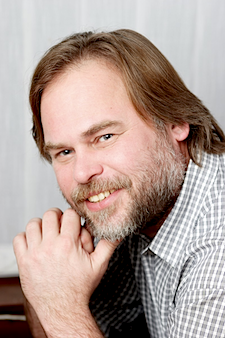Eugene Kaspersky is one tough guy
The security community deals with disturbing news all the time, but none so disturbing as the reports that the son of Eugene Kaspersky, founder and CEO of Kaspersky Lab, has been kidnapped (and now reportedly freed). Russia is a tough place.
The Western stereotype of a Russian businessman is a politically-connected tyrant who probably only got his business through corrupt means. Not Yevgeny "Eugene" Kaspersky; I don't really know much about how he built his business, but I do know that his company has developed high-quality, respected security products that sell really well in the West. He's a genuine engineer, who worked on his own products until the company got too big for that to make sense. You can't do that by bribing public officials.
The first time I met Kaspersky, I remarked on how there seemed to be a prominent and respected security software industry in Russia, but I couldn't think of any non-security Russian software companies that had any presence in the West. "What's so special about security development in Russia?" I asked.
Kaspersky grew a bit testy -- defensive -- at the question. "We have a big software industry!" he answered, and then he went on to repeat my point by saying that these companies exist, but I just didn't know about them. I got the distinct sense that he was proud of being Russian. "That's cool," I thought; there are certainly things to admire about Russia.
But I also thought that it must be treacherous to be a successful businessman there. Ever since the fall of Communism, the country has a history of being harsh on businessmen, no less than political dissidents, who don't make nice with the right people.
 Last January, I got invited to a conference put on by Kaspersky in Moscow. I'd never taken up a vendor on one of these invitations before but going to Russia was so exciting I decided to accept. Kaspersky Lab paid for the travel (first class!), the hotel (pretty good) and the food (yuck; bread and vodka were wonderful, everything else wasn't). The people were also all very nice. Moscow in January! It looked a lot colder than it felt. I have a Russian-strength cold tolerance. It didn't bother me.
Last January, I got invited to a conference put on by Kaspersky in Moscow. I'd never taken up a vendor on one of these invitations before but going to Russia was so exciting I decided to accept. Kaspersky Lab paid for the travel (first class!), the hotel (pretty good) and the food (yuck; bread and vodka were wonderful, everything else wasn't). The people were also all very nice. Moscow in January! It looked a lot colder than it felt. I have a Russian-strength cold tolerance. It didn't bother me.
While my grandparents all came from Russia, I don't have a whole lot of personal experience with the country. But it's clear things don't work there the way they work here. One clue I got was the one night when they took all of us press people out to the Kaspersky Lab offices for the obligatory "factory tour."
Traffic in Moscow is bad, almost science fiction dystopia bad, and the ride of maybe 10 miles can take hours under normal circumstances (which is why the subway system is so large and heavily-utilized). But we didn't have much of a problem: A police escort for our buses had lights and sirens on, leading us on the shoulder, in opposing lanes, and pushing other vehicles out of the way. In the United States, this might happen for the President or some foreign dignitary, but the average company can't just order it up from the police department for some guests.
Perhaps this is a standard service offered by the police for a set rate, or perhaps Kaspersky is well-connected. I hope his connections help in this matter with his son.
Russia is capable of so much and it bothers me that the country has such an atrocious political tradition. If they're ever going to achieve something more free, entrepreneurs like Eugene Kaspersky will have to play a big part. For his sake and for Russia's, I hope his son is OK and that the country develops some more respect for the rule of law.
 Larry Seltzer is a freelance writer and consultant, dealing mostly with security matters. He has written recently for Infoworld, eWEEK, Dr. Dobb's Journal, and is a Contibuting Editor at PC Magazine and author of their Security Watch blog. He has also written for Symantec Authentication (formerly VeriSign) and Lumension's Intelligent Whitelisting site.
Larry Seltzer is a freelance writer and consultant, dealing mostly with security matters. He has written recently for Infoworld, eWEEK, Dr. Dobb's Journal, and is a Contibuting Editor at PC Magazine and author of their Security Watch blog. He has also written for Symantec Authentication (formerly VeriSign) and Lumension's Intelligent Whitelisting site.
